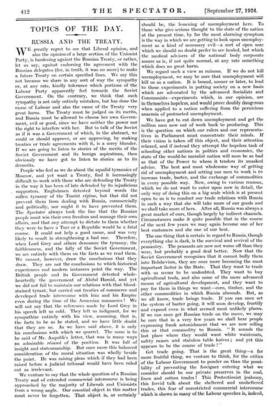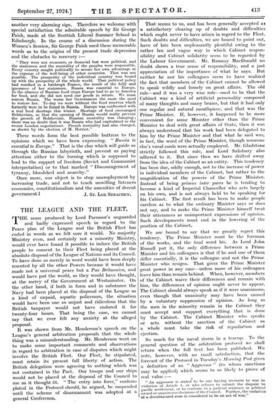TOPICS OF THE DAY.
RUSSIA AND THE TREATY.
WE greatly regret to see that Liberal opinion, and also the opinion of a large section of the Unionist Party, is hardening against the Russian Treaty, or rather, let us say, against endorsing the agreement with the Russian delegates (for, in truth, it was no more) to make a future Treaty on certain specified lines. We say this not because we share in any sort of way the sympathy or, at any rate, kindly tolerance which portions of the Labour Party apparently feel towards the Soviet Government. On the contrary, we think that such sympathy is not only entirely mistaken, but has done the cause of Labour and also the cause of the Treaty very great harm. The Treaty must be judged on its merits, and Russia must be -allowed to choose her own Govern- ment, evil or good, since we have neither the power . nor the right to interfere with her. But to talk of the Soviet as if it was a Government of which, in the abstract, we could or should approve, or are approving, by making treaties or trade agreements with it, is a sorry blunder. If we are going to listen to stories of the merits of the Soviet Government and its benign aspirations, then obviously we have got to listen to stories as to its demerits.
People who feel as we do about the squalid tyrannies of Moscow, and yet want a Treaty, find it increasingly difficult to work with those who arc defending the Treaty in the way it has been of late defended by its injudicious . supporters. Englishmen detested beyond words the sullen tyranny of the Tsarist regime, but that did not prevent them from dealing with Russia, commercially and politically, nor ought it to have prevented them. The Spectator always took the line that the Russian people must win their own freedom and manage their own affairs, and that any attempt to dictate to them whether they were to have a Tsar or a Republic would be a fatal course. It could not help a good cause, and was very likely to result in strengthening a bad one. Therefore, when Lord Grey and others denounce the tyranny, the faithlessness, and the folly of the Soviet Government, we are entirely with them on the facts as we read them. We cannot, however, draw the conclusions that they draw. They are not the conclusions to which historical experiences and modern instances point the way. The British people and its Government detested whole- heartedly the government of Abdul Hamid, and yet we did not fail to maintain our relations with that blood- stained tyrant, but carried out treaties of commerce and developed trade intercourse with him and his Empire even during the time of the Armenian massacres ! We will not say that the references made by Lord Grey in his speech left us cold. They left us indignant, for we sympathize entirely with his view, assuming, that is, the facts to be as he stated, and we have little doubt that they are so. As we have said above, it is only his conclusions with which we quarrel. The same is to be said of Mr. Asquith's letter, that was in many ways an admirable résumé of the position. It was full of insight and statesmanship. But once more this balanced consideration of the moral situation was wholly beside the point. He was raising pleas which if they had been raised before a judicial tribunal would have been ruled out as irrelevant.
We venture to say that the whole question of a Russian Treaty and of extended commercial intercourse is being approached by the majority of Liberals and Unionists from a wrong angle. Our essential object in this matter must never be forgotten. That object is, or- certainly should be, the lessening of unemployment here. To those who give serious thought to the state of the nation at the present time, by far the most alarming symptom is the way in which we are getting to look upon unemploy- ment as a kind of necessary evil—a sort of open sore which we should no doubt prefer to see healed, but which the medical advisers of the national body corporate assure us is, if not quite normal, at any rate something which does no great harm. We regard such a view as ruinous. If we do not kill unemployment, we may be sure that unemployment will kill us as a nation. It is bound, sooner or later, to lead to those experiments in putting society on a new basis which are advocated by the advanced Socialists and Communists—experiments which, in our opinion, are in themselves hopeless, and would prove doubly dangerous when applied to a nation suffering from the pernicious anaemia of protracted unemployment.
We have got to cut down unemployment and get, the million men now out of work back to producing. This is the question on which our rulers and our representa- tives in Parliament must concentrate their minds. If their vision is taken off this object, and their attention relaxed, and if instead they attempt the hopeless task of schooling other nations in politics and economics, the state of the would-be moralist nation will soon be as bad as that of the Power to whom it tenders its unasked advice. The best and most wholesome way of getting rid of unemployment and setting our men to work is to increase trade, barter, and the exchange of commodities in every possible way. Now, owing to various reasons, which we do not want to enter upon now in detail, the only way of doing this on a big scale which is at present open to us is to conduct our trade relations with Russia in such a way that she will take more of our goods and we shall take more of hers. After all, Russia was always a great market of ours, though largely by indirect channels. Circumstances make it quite possible that in the course of the next few years we may again become one of her best customers and she one of our best.
The one thing that is certain in regard to Russia, though everything else is dark, is the survival and revival of the peasantry. The peasants are now not worse off than they were, but probably a good deal better. Now that the Soviet Government recognizes that it cannot bully them into Bolshevism, they are once more becoming the most important factor in the State. That they want to trade with us seems to be undoubted. They want to buy agricultural tools, and also some of the more advanced means of agricultural development, and they want to pay for them in things we want—corn, timber, and the other commodities in which Russia abounds. But, as we all know, trade brings trade. If you can once set the system of barter going, it will soon develop, fructify and expand even in what seemed most unlikely places. If we can once get Russian trade on the move, we may be sure that in a very few years we shall hear people expressing frank astonishment that we are now selling this or that commodity to Russia. " It sounds the last place where they would want white waistcoats, safety razors and stainless table knives ; and yet this appears to be the course of trade ! "
Get trade going. That is the great thing—a far more fruitful thing, we venture to think, for the critics of the Labour Government to ponder on than the possi- bility of preventing the foreigner entering what we consider should be our private preserves in the coal, linen and cotton trades 1 This Protectionist jealousy, this fervid talk about the sheltered and unsheltered trades, this fear of unrestricted commercial intercourse which is shown in many of the Labour speeches is, indeed, another very alarming sign. Therefore we welcome with special satisfaction the admirable speech by Sir George Paish, made at the Scottish Liberal Summer School in Edinburgh. In the course of a discussion during the Women's Session, Sir George Paish used these memorable ,words as to the origins of the present trade depression and the obstacles to recovery :— " They were not economics or financial but were political, and the statesmen and the mentality of the peoples were responsible. Every country sought politically to secure her own advantage at the expense of the well-being of other countries. That was not possible. The prosperity of the individual country was bound up with the prosperity of the whole world. That political policy had resulted in a bankrupt France, the result of the folly and ignorance of her statesmen. Russia was essential to Europe. In the absence of Russian food crops Europe had to go to America for food, and she did not need our goods in return. We must restore Russia. The worse her Government the more the need to restore her. To-day we were without the food reserves which formerly were to be found in Russia. Europe was confronted with a real food shortage this winter. Shortage of food encouraged Bolshevism, so that the opening of Russia would really prevent the growth of Bolshevism. Russian mentality was changing ; there was no doubt that it was Russia who had capitulated in the recent London negotiations. French mentality had also changed, as shown by the election of M. Herriot."
These words form the best possible buttress to the opinions which we have been expressing. " Russ-is is essential to Europe." That is the clue which will guide us through the Russian labyrinth, and prevent us paying attention either to the turning which is supposed to lead to the support of freedom (Soviet and Communist interpretation) or to that marked " Discouragement of tyranny, bloodshed and anarchy."
Once more, our object is to stop unemployment by increasing trade, and not to teach unwilling listeners economics, constitutionalism and the amenities of decent







































 Previous page
Previous page